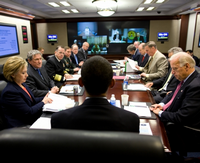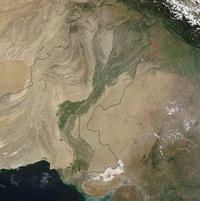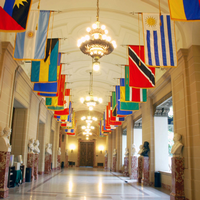Here are a few of this week’s highlights from WPR’s video section: – This Al Jazeera video breaks the story that Taliban leaders held a secret meeting in the Maldives to discuss Afghan President Hamid Karzai’s reintegration plan. – Two members of the Russian media discuss perceptions of President Barack Obama in Russia as well as U.S.-Russia relations in this WorldFocus video. -Secretary of State Hillary Clinton’s Internet freedom speech at the Newseum raised eyebrows in China.Our video sectionis updated daily. I’ll highlight videos we post there from time to timeon this blog. Got a tip for where we can […]
Global Archive
Free Newsletter
Dozens of countries, including the United States, continue to abduct and detain terrorism suspects in secret detention centers despite clear prohibitions against such practices under international law, according to a new report from United Nations expert investigators. Algeria, China, Russia, Sudan, Zimbabwe, Ethiopia, Poland and Pakistan are also among the countries charged with using or colluding in the use of these detention practices. “In spite of these unequivocal norms, the practice of secret detention in the context of countering terrorism is widespread and has been reinvigorated by the so-called global war on terror. . . . If resorted to in […]

Two weeks ago, while discussing last November’s tragic events at Fort Hood, Defense Secretary Robert Gates proclaimed that the Pentagon “is burdened by 20th century processes and attitudes mostly rooted in the Cold War.” This acknowledgement by a wartime defense secretary is yet another stark reminder that the broader U.S. national security system was also designed for a much different era, and stands in need of a holistic review and systemic modernization. When the National Security Act of 1947 was enacted, the national and global security environments were exceedingly different from those that exist today. Responding to the costly inefficiencies […]
Marcus Mabry, international business editor of The New York Times, andJohn Authers, the investment editor for the Financial Times, talk toWorldFocus’ Daljit Dhaliwal about the impact of U.S. economic policiesoverseas, the risk of inflation in China, the fate of Japan’s economyand recovery efforts across Europe. Mabry says that though the UnitedStates has historically been the driver of the global economy,developing countries, in particular China, will have to begin to pickup the slack. Authers says eradicating severe unemployment will be key to economic progress.

It’s taken as gospel by most pundits today that we live in an increasingly dangerous, deadly and unstable world — with Haiti’s horrific earthquake serving as the latest, irrefutable data point. We are told that ours is a planet at perpetual war with itself, locked in a global conflict that is not only cast in civilizational terms, but superimposed over a landscape chock-full of never-ending combat and ever-rising death tolls. The end of the Cold War superpower rivalry, rather than pacifying the world, actually unlocked a Pandora’s box of tribal hatreds. In retrospect, the Cold War has even taken on […]
Secretary of State Hilary Clinton spoke about the importance ofInternet freedom at the Newseum in Washington D.C. This talk comes onthe heels of Google’s run-in with the Chinese government and theirsubsequent threat to pull their products out of the country. In herspeech, Clinton identifies China, Tunisia and Uzbekistan as countriesthat have recently tightened their control over the Internet.
There’s been a lot of speculation about the mid- to long-term impact on U.S. foreign policy of the Haiti earthquake and America’s response to it. I was surprised to see how quickly the assumptions turned sour. Already last Friday, I participated in a France 24 program in which one analyst had already identified Haiti as a long-term — and major — problem for President Barack Obama, along the lines of waging the Afghanistan war and winding down the Iraq war. My sense is that this is a bit overblown. The unfolding operation in Haiti is a stability operation, not a […]
The increasing ability of human rights defenders and organizations to effectively push for protections resulted in a concerted campaign by abusive governments in 2009 to attack the rights movement, Human Rights Watch says in its 2010 annual report. “Today, activists are capable of exposing abuses most anywhere in the world, shining an intense spotlight of shame on those responsible, rallying concerned governments and institutions to use their influence on behalf of victims, and in severe cases, persuading international prosecutors to bring abusers to justice,” HRW Executive Director Kenneth Roth wrote in the report’s introduction. But although such attacks could be […]
Not long ago, I wrote about the ways in which 9/11 affected U.S. foreign policy, and in particular, how our approach has “gone micro, with engagement conceived of lessin terms of actors (i.e., a country’s government and military), andmore in terms of fields (i.e., its society).” The following day, I came across a report by Matt Armstrong (via Small Wars Journal) on how to redesign the State Department to better meet contemporary foreign policy challenges. It’s a very smart argument for going macro, and reworking the department’s bureaucratic hierarchy to prioritize regional approaches. Essentially, that would mean aligning State’s regional […]
With 2009 and its year-end Top 10 lists comfortably packed away, the Carnegie Council held an event last week to usher in the New Year with a list of what to worry about in 2010. Panelists included Eurasia Group president — and WPR contributor — Ian Bremmer; the executive director of the U.N. Global Compact, Georg Kell; the editor in chief of strategy+business, Art Kleiner; and the executive director of the World Policy Institute, Michele Wucker. Bremmer kicked things off with highlights from his recently published Eurasia Group report. Here’s a sample from his overall list, with each risk weighted […]

In the aftermath of Copenhagen, many observers are lamenting the apparent unwillingness of governments to confront climate change. However, this unwillingness simply reflects an essential truth about public policy: The immediate always trumps the distant. For most policymakers, the threat of climate change remains a distant one. Governments prioritize immediate threats, even if doing so hastens the melting of glaciers and the rising of sea levels that may eventually destroy habitats and nations. Another vivid illustration of this mindset is the acquisition by foreign governments of vast tracts of farmland across the developing world. These land deals leave immense carbon […]

The sage’s transformation of the world arises from solving the problem of water. If water is united, the human heart will be corrected. If water is pure and clean, the heart of the people will readily be unified and desirous of cleanliness. Even when the citizenry’s heart is changed, their conduct will not be depraved. So the sage’s government does not consist of talking to people and persuading them, family by family. The pivot (of work) is water. — Lao Tze Water management is, by definition, conflict management. Water, unlike other scarce, consumable resources, is essential to all facets of […]

Last week, as part of my company’s investment work in the health care industry, I sat through a marketing pitch from a Chinese manufacturer of low-cost and disposable drug tests, many of which deliver results in mere seconds. They ranged from the familiar home pregnancy tests to sophisticated multi-panel urine screens (for narcotics) — and even included a mouth swab for measuring blood-alcohol levels, the kind you’ll soon be scooping out of a bowl at your favorite bar to check your ability to drive before heading home. The pitch got me thinking about our collective future in this era of […]
Here are a few of this week’s highlights from WPR’s video section: – Google has threatened to pull out of China after suspicious cyber-attacks on its products in the country. WSJ breaks down the situation from Hong Kong in this video. – Special envoy to the Middle East George Mitchell says peace is possible in the region during this interview with Charlie Rose. – India and Bangladesh are improving relations as Bangladesh cracks down on separatist rebels and India welcomes the Bangladeshi prime minister. Al Jazeera explains in this video. – North Korea’s call for peace talks was swiftly shut […]

In a WPR blog post earlier this week, Judah Grunstein described the “Yemen frenzy” induced by the failed Christmas Day airliner bombing plot as a post-9/11, “Pavlovian response.” But there’s more to the conditioned behavior than just the push for a massive, whole-of-government intervention in a country linked to an attempted domestic terrorist attack, and in which al-Qaida has a presence. A second factor at play is the tendency of the U.S. government — and indeed, of the entire political establishment — to dart from crisis to crisis, pouring time, treasure and resources into responding to the headlines of the […]
In his WPR column a few weeks back, David Axe called attention to South Korea’s promised troop deployment to Afghanistan, and it bears repeating, because I think it’s actually one of the more significant “quiet moves” to emerge recently. For more background on Seoul’s decision in the context of the U.S.-ROK alliance, see this March 2009 WPR briefing by Nirav Patel (itself based on this CNAS report). For a more ROK-centric analysis, there’s also this Asia Foundation article by Michael Finnegan — who notes that the operational capabilities the deployment will provide could have potential applications on the Korean Peninsula […]
The global economy wasn’t the only thing that contracted in 2009. Intensified repression against human rights defenders and civic activists around the world helped make 2009 a “rights recession,” watchdog group Freedom House says in its “Freedom of the World 2010” report. 2009 was the fourth consecutive year of decline, the longest continuous downward slide Freedom House has ever recorded. The group also noted that analysis of data between 2005 and 2009 shows “there have been growing pressures on freedom of expression, including press freedom, as well as on civic activists engaged in promoting political reform and respect for human […]
